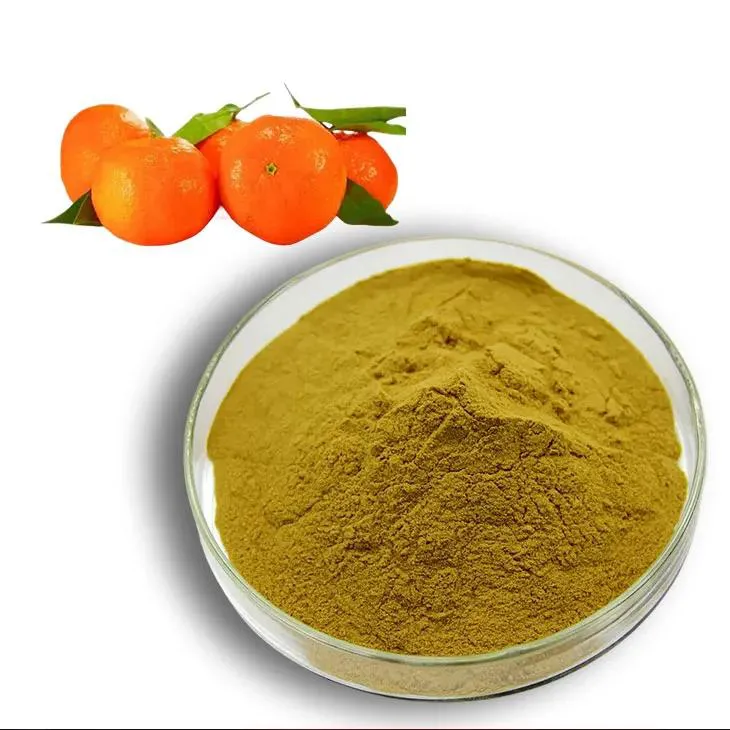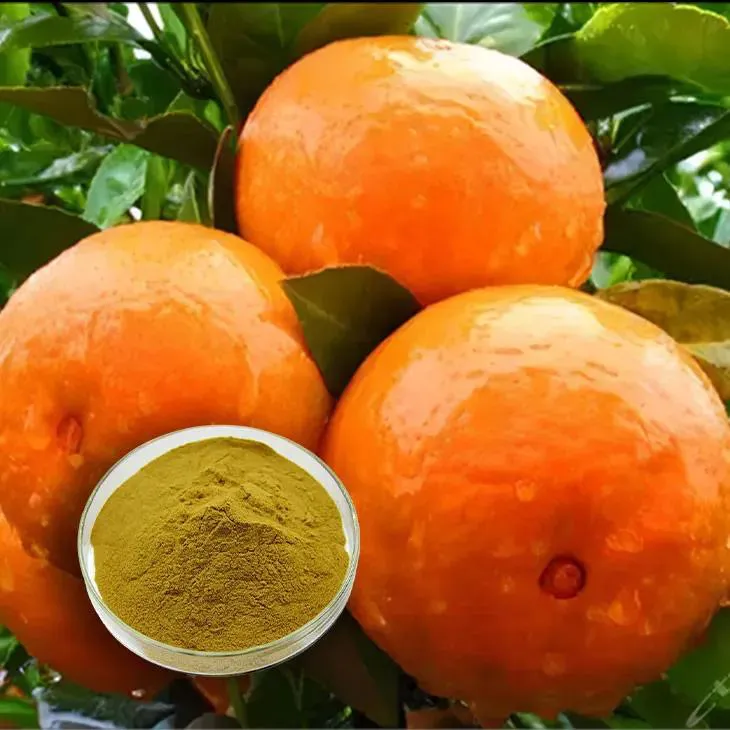- 0086-571-85302990
- sales@greenskybio.com
Citrus Bioflavonoids: What Are the Benefits and How to Take Them?
2024-11-13

Introduction
Citrus fruits are not only delicious but also rich in various nutrients. Among these, citrus bioflavonoids are a group of compounds that have been receiving increasing attention in recent years. These bioflavonoids offer a wide range of potential benefits for human health. In this article, we will explore what citrus bioflavonoids are, their benefits, and how to incorporate them into your diet effectively.

What are Citrus Bioflavonoids?
Citrus bioflavonoids are a class of polyphenolic compounds found in citrus fruits such as oranges, lemons, grapefruits, and limes. They are responsible for the colors of the citrus fruits' peels, pulp, and membranes. There are several types of citrus bioflavonoids, including Hesperidin, naringin, and Quercetin. These compounds are often found in combination with vitamin C in citrus fruits, and they work synergistically with vitamin C in many physiological processes.

Benefits of Citrus Bioflavonoids
1. Cardiovascular Benefits
Antioxidant Activity: One of the key benefits of citrus bioflavonoids is their antioxidant activity. They help to protect the cells in the body from oxidative stress caused by free radicals. In the cardiovascular system, this antioxidant effect can prevent the oxidation of low - density lipoprotein (LDL) cholesterol. Oxidized LDL cholesterol is a major contributor to the development of atherosclerosis, a condition in which plaque builds up in the arteries. By preventing this oxidation, citrus bioflavonoids may reduce the risk of heart disease.
Blood Pressure Regulation: Some studies suggest that citrus bioflavonoids may also play a role in regulating blood pressure. For example, Hesperidin has been shown to have vasodilatory effects, which means it can relax the blood vessels. This relaxation helps to lower blood pressure and improve blood flow. Lower blood pressure is associated with a reduced risk of heart attacks, strokes, and other cardiovascular problems.
Anti - inflammatory Effects: Inflammation is a key factor in the development of cardiovascular diseases. Citrus bioflavonoids possess anti - inflammatory properties that can help to reduce chronic inflammation in the body. This can be beneficial for the cardiovascular system by reducing the inflammation in the blood vessels and surrounding tissues.
2. Immune System Support
Enhanced Immune Response: Citrus bioflavonoids can enhance the immune system. They work in concert with vitamin C to stimulate the production of white blood cells, which are the body's main defense against infections. The combination of bioflavonoids and vitamin C can strengthen the immune system and help the body to fight off viruses, bacteria, and other pathogens more effectively.
Antiviral Properties: Some citrus bioflavonoids, such as Quercetin, have been shown to have antiviral properties. They can interfere with the replication of viruses, making it more difficult for viruses to multiply in the body. This can be particularly useful during cold and flu seasons or in the face of emerging viral threats.
3. Skin Health
Antioxidant Protection for the Skin: The antioxidant properties of citrus bioflavonoids are also beneficial for the skin. Free radicals in the environment can damage the skin cells, leading to premature aging, wrinkles, and other skin problems. By neutralizing these free radicals, citrus bioflavonoids can help to protect the skin from damage and keep it looking healthy and youthful.
Collagen Production: Citrus bioflavonoids can also stimulate the production of collagen in the skin. Collagen is a protein that provides structure and elasticity to the skin. As we age, collagen production decreases, leading to sagging skin. By promoting collagen production, citrus bioflavonoids can help to maintain the firmness and elasticity of the skin.
4. Digestive Health
Improved Gut Function: Citrus bioflavonoids can have a positive impact on digestive health. They can help to regulate the gut microbiota, which is the community of bacteria and other microorganisms that live in the digestive tract. A healthy gut microbiota is essential for proper digestion, nutrient absorption, and overall health. Some studies have shown that citrus bioflavonoids can increase the number of beneficial bacteria in the gut and reduce the growth of harmful bacteria.
Anti - ulcer Properties: Certain citrus bioflavonoids have anti - ulcer properties. They can protect the lining of the stomach and intestines from damage caused by factors such as stress, Helicobacter pylori infection, or the use of non - steroidal anti - inflammatory drugs (NSAIDs). By reducing the risk of ulcers, citrus bioflavonoids can contribute to better digestive health.

How to Take Citrus Bioflavonoids
1. Dietary Sources
The best way to obtain citrus bioflavonoids is through a diet rich in citrus fruits. Here are some of the common citrus fruits and their bioflavonoid content:
- Oranges: Oranges are a great source of Hesperidin. Eating an orange or drinking fresh orange juice can provide a significant amount of citrus bioflavonoids.
- Lemons: Lemons contain bioflavonoids such as Quercetin. Lemon juice can be used in cooking, added to water, or used in salad dressings to incorporate these bioflavonoids into your diet.
- Grapefruits: Grapefruits are rich in naringin. Eating a grapefruit or drinking grapefruit juice is an excellent way to get citrus bioflavonoids.
- Limes: Limes also contain bioflavonoids and can be used in a similar way to lemons in cooking and beverages.
It is important to note that consuming whole fruits is generally better than drinking fruit juices alone. Whole fruits contain fiber, which can help with digestion and also slows down the absorption of sugars, preventing spikes in blood sugar levels.
2. Supplements
If it is difficult to obtain enough citrus bioflavonoids from diet alone, supplements can be an option. However, it is important to choose high - quality supplements from reliable sources.
- Consult a Doctor: Before starting any supplement, it is advisable to consult a doctor or a healthcare professional. They can assess your individual health needs and determine if a citrus bioflavonoid supplement is appropriate for you.
- Read the Label: When choosing a supplement, carefully read the label to ensure that it contains the specific bioflavonoids you are looking for. Also, check for any additional ingredients and make sure there are no allergens or substances that may cause adverse reactions.
- Follow the Recommended Dosage: Supplements should be taken according to the recommended dosage. Taking too much of a supplement can be harmful and may cause side effects.
Conclusion
Citrus bioflavonoids offer a wide range of potential benefits for health, including cardiovascular health, immune system support, skin health, and digestive health. They can be obtained through a diet rich in citrus fruits or through supplements. However, it is always important to maintain a balanced diet and consult a healthcare professional before starting any new supplement regimen. By incorporating citrus bioflavonoids into your lifestyle, you can potentially improve your overall health and well - being.
FAQ:
What are citrus bioflavonoids?
Citrus bioflavonoids are a group of plant - based compounds found in citrus fruits such as oranges, lemons, and grapefruits. They are known for their antioxidant properties and play important roles in maintaining the health of the body.
What are the potential cardiovascular benefits of citrus bioflavonoids?
Citrus bioflavonoids may have several cardiovascular benefits. They can help reduce inflammation in the blood vessels, improve blood vessel function, and potentially lower blood pressure. Some studies also suggest that they may help in reducing cholesterol levels, which is beneficial for heart health.
Can citrus bioflavonoids boost the immune system?
Yes, they can. Their antioxidant properties help to neutralize free radicals in the body, which can reduce oxidative stress and support the immune system. By protecting cells from damage, citrus bioflavonoids contribute to the overall well - being and the body's ability to fight off infections.
How can one consume citrus bioflavonoids?
One can consume citrus bioflavonoids by eating whole citrus fruits, drinking fresh - squeezed citrus juices (without added sugars), or taking dietary supplements. However, it's important to note that supplements should be taken under the guidance of a healthcare professional.
Are there any side effects of taking citrus bioflavonoids?
When consumed in normal amounts through food sources, citrus bioflavonoids are generally safe. However, in high - dose supplement form, some people may experience mild side effects such as stomach upset or allergic reactions. It's always advisable to start with a low dose when taking supplements and monitor for any adverse effects.
Related literature
- The Role of Citrus Bioflavonoids in Health and Disease"
- "Citrus Bioflavonoids: A Review of Their Antioxidant and Anti - Inflammatory Properties"
- "Beneficial Effects of Citrus Bioflavonoids on Cardiovascular Health"
- ▶ Hesperidin
- ▶ citrus bioflavonoids
- ▶ plant extract
- ▶ lycopene
- ▶ Diosmin
- ▶ Grape seed extract
- ▶ Sea buckthorn Juice Powder
- ▶ Beetroot powder
- ▶ Hops Extract
- ▶ Artichoke Extract
- ▶ Reishi mushroom extract
- ▶ Astaxanthin
- ▶ Green Tea Extract
- ▶ Curcumin Extract
- ▶ Horse Chestnut Extract
- ▶ Other Problems
- ▶ Boswellia Serrata Extract
- ▶ Resveratrol Extract
- ▶ Marigold Extract
- ▶ Grape Leaf Extract
- ▶ blog3
-
Cranberry Plants and Skin - care Products.
2024-11-13
-
Echinacea Extract
2024-11-13
-
Curcumin Extract
2024-11-13
-
Phellodendron Extract
2024-11-13
-
Chasteberry Extract
2024-11-13
-
Sugarcane Extract
2024-11-13
-
Angelica sinensis extract
2024-11-13
-
Plantain extract
2024-11-13
-
Hawthorn Extract
2024-11-13
-
Sea buckthorn Juice Powder
2024-11-13
-
Selenium yeast
2024-11-13





















